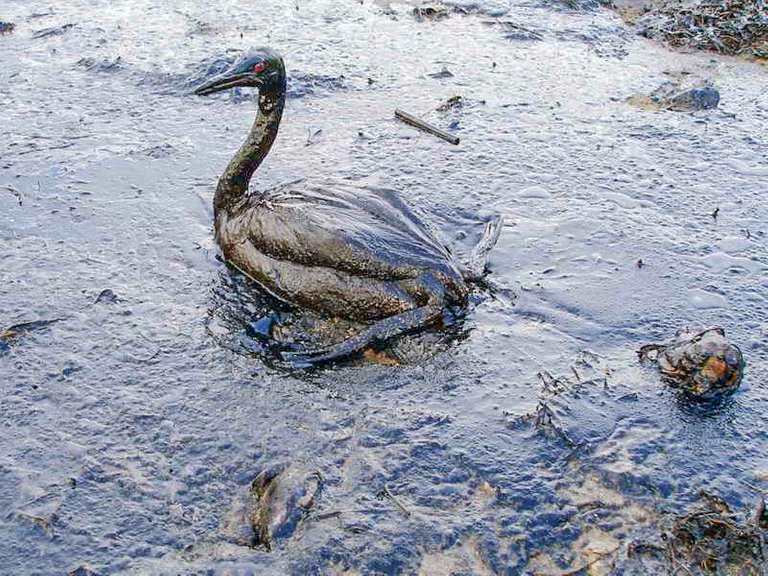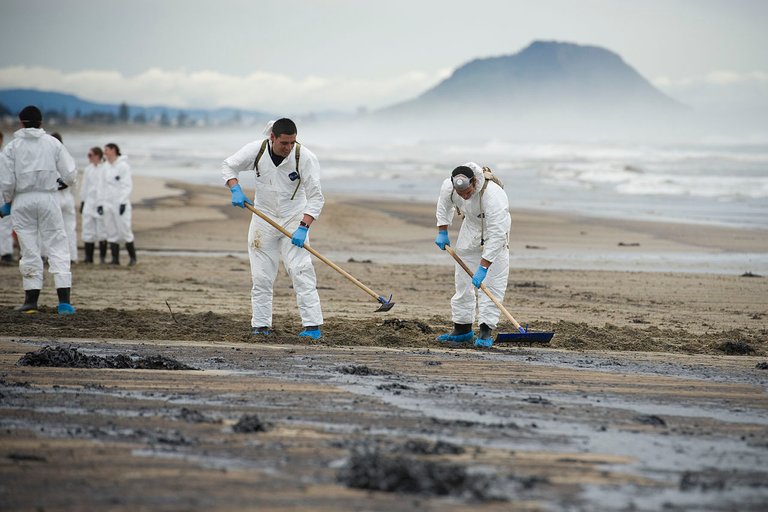Oil spillage and its detrimental effects on the environment
Nigeria is one country that has been plagued with insurrections of different forms both in the past and presently. One of those insurrections was due to the degradation of the environment through the spillage of oil. The Niger Delta region of the country is blessed with crude oil deposits, but the blessing has led to the cursing of the environment. The ecological structure of the environment has been significantly altered with the soil becoming useless for agricultural activities and the water rendered unsuitable for domestic use and inhabitable by aquatic lives.
The degradation of the environment by oil extraction activities of oil companies led to agitations by the communities in which these oils are domiciled. The communities are left at the mercy of the degraded environment and in turn, members of the communities took up arms and revolted against the government and the oil companies to either stop their oil extraction activities or find a way to clean up the environment.
Oil spills are common problems that lots of oil extractors often face. It ranges from very small to fatal happenings yearly on water bodies or even in terrestrial environments. When oil spills, it has several effects on the ecosystem around it and the food chains between them. Oil spills can be caused by several different accidents. One of such accidents is when a ship releases more oil than it is allowed from its bilges. This may happen if the ship does not use an oily water separator to clean the water first.
Another cause of an oil spill is the use of faulty equipment. If a piece of equipment develops a fault unexpectedly, it is likely to have dire consequences. For example, if a drilling rig stops working unexpectedly, it will end up not being able to keep up with the pressure of the oil coming from below. This is most likely to cause a huge blowout thereby causing a large amount of oil to be released into the environment.

If a ship is affected by very bad weather while it is holding oil, the result could be fatal. In very severe cases, the ship itself might break into two separate pieces. Natural disasters such as earthquakes can also lead to violent movement in the seabed thereby causing pipelines to break.
Virtually all the living organisms in an environment where spillage happens suffer the consequence. When oil pollutes the water that plants take up, the plants take up the oil along with the water. Sometimes, the oil is very toxic and kills the plant in a short time. When the oil is taken up with the water, it is likely to get into the vascular system as well as intercellular spaces. This could lead to blockage so the plant dies as the necessary metabolites for normal functioning are not able to circulate. Oil can also block the stomata on the leaves of a plant leading to a reduction in gas exchange as well as evapotranspiration. A shortage of carbon dioxide required for photosynthesis may cause the plant to die.
The first time I learned about oil spills, I was greeted with a picture of a bird drenched in oil and unable to fly. The thermal insulation and buoyancy provided by feathers and fur of birds and mammals are reduced greatly if they come in contact with oil making them susceptible to hypothermia. They are also at risk of drowning.
Humans and other animals which are higher up on the food chain might ingest a large amount of oil if they eat polluted fish. Oil, when ingested travels to the liver and kidneys. These organs are affected by the toxins in the oil and may become damaged. Exposure of the gastrointestinal tract to oil can also be very dangerous. The oil injures the tract so it is unable to process food. The affected animal will get weak as a result of this and may die from a lack of energy for normal metabolism.
Most of the earth’s energy is gotten from the sun as plants are the only living things that can convert sunlight to chemical energy, they are always the producers and form the base of all food chains. This means that they are very crucial in ensuring the continuity of ecosystems. When an oil spill happens and plants take up oil, they die prematurely.
This reduces the amount of food available for the primary consumers and therefore, all the other animals higher up the food chain. Some plants, however, are able to bioaccumulate oils and survive in oil spilled ecosystems. When the few plants that survive are eaten by the animals, the oil they have taken up accumulates in the animal and in most cases, leads to their death.
Cleaning up oil spills is not really an easy task. Thanks to technology though, there are now various methods for cleaning up environments that are polluted with oil. Depending on the size of the spill, it can take a few months to as much as a year to clean up an oil spill. One of the frequently used methods when cleaning up a spill is bioremediation. This involves the use of microorganisms such as bacteria to break down the oil into components that are usually harmless. Other times, plants with the inherent ability to bioaccumulate oils are used to augment the effort of microbes. This method, however, takes a bit of time.

Another method for getting rid of spilled oil is controlled burning. This method is quite simple and only involves setting the oil on fire. However, it will not work if the area is too windy as this will likely cause air pollution. Substances known as solidifiers are also used in some cases. These substances are made up of “water-hating” polymers which change the state of the oil from liquid to solid. The solid oil has been converted to floats on the water and can be removed with no hassle at all.
Other methods used in cleaning up oil spilled environments include the use of oil booms and skimmers, the use of sorbents, spraying dispersants to enhance natural breakdown of the oil, hot water, and high-pressure washing, or the use of manual labourers who make use of hand-held tools to physically remove the oil.
Resources
- https://www.marineinsight.com/environment/10-methods-for-oil-spill-cleanup-at-sea/
- https://en.wikipedia.org/wiki/Oil_spill
- https://response.restoration.noaa.gov/training-and-education/education-students-and-teachers/how-do-spills-happen.html
- https://sciencing.com/effects-oil-spills-5134989.html
- https://response.restoration.noaa.gov/oil-and-chemical-spills/oil-spills/how-oil-harms-animals-and-plants-marine-environments.html
Posted with STEMGeeks
Oil is a very dirty business literally and financially. We have many places here in the U.S. that are polluted and will be uninhabitable due to the very things you bring up in this article. Nothing breaks my heart more than to see the impact a spill has on the environment.
In Nigeria, nothing is done to ameliorate the lives of those affected by oil spills. This has led to an insurrection against the government.
https://twitter.com/gentleshaid/status/1478314336833712132
The rewards earned on this comment will go directly to the person sharing the post on Twitter as long as they are registered with @poshtoken. Sign up at https://hiveposh.com.
Saw a video where the authorities caught some people bunkering oil and instead of confiscating it, they were throwing gallons into the river and I was in awe.
I don't think our government cares about the cleanup so this might continue for a long while and the damages will continue to run deep.
Our gov do not care about human lives. This is our reality
They prefer animals 😆
So terrible. I really like seeing wildlife the way it should be.
Indeed
This is a serious issue and the effect may be disastrous if there is no functioning agency, an arm of government that has its primary aim on taking care of that, especially in oil blessed regions
The insurrections in the form of militancy and Biafra are just a few aftermath
Those who pollute... should clean and pay for the bill. This is how an ideal world should work. We are however far from living in an ideal world :(
Most oil Multinationals around here don't dive a damn for the environment or the people. It is cheaper to bribe a few people than to spend tons on cleaning up oil spillages.
I unfortunately agree :(
Seems that wherever there is oil, there is environmental destruction with war following not far behind.
Appreciated the insights in our post. I'm the most hopeful about bioremediation.
Gotta wonder, though, how civilized we really are collectively though.
Crude oil has become a gift with a bomb inside. I wonder if life in Nigeria would have been better without crude oil, seems to have caused more harm than good.
The problem with crude oil in Nigeria is basically bad leadership
Thanks for your contribution to the STEMsocial community. Feel free to join us on discord to get to know the rest of us!
Please consider delegating to the @stemsocial account (85% of the curation rewards are returned).
You may also include @stemsocial as a beneficiary of the rewards of this post to get a stronger support.
Your content has been voted as a part of Encouragement program. Keep up the good work!
Use Ecency daily to boost your growth on platform!
Support Ecency
Vote for new Proposal
Delegate HP and earn more
Cool. I wonder to what extent this is plausible. I hear a lot of things that sounds earth-saving, but a closer inspection finds it only has limited application. Ultimately the solution to these crises are never one single thing we see in clickbait, but dozens or hundreds, even thousands of different methods and approaches depending on conditions in a given location.
Such a pain X(
As I was reading this, I remembered the method of cleanup by bacteria which I read about years ago, when it was new. Glad to see this is now considered "[o]ne of the frequently used methods"!